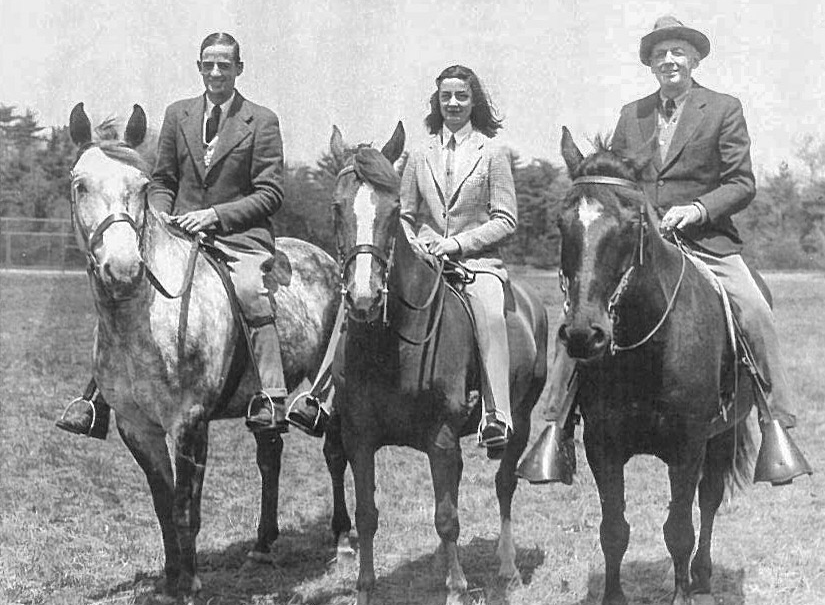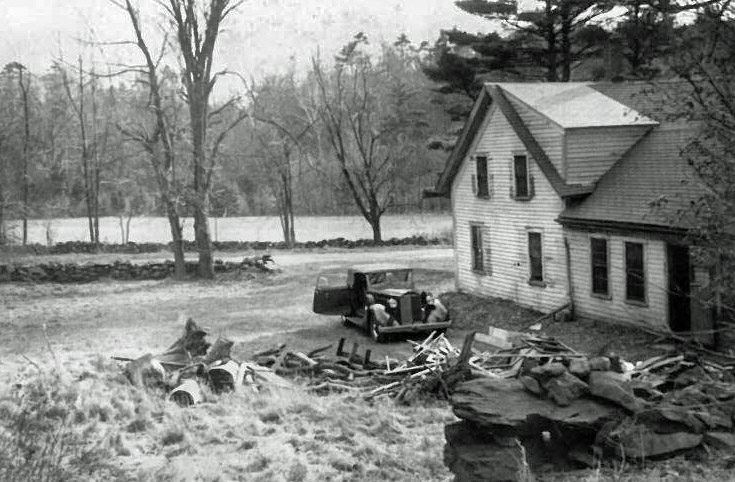True Tales from Canton’s Past: Moving to Canton
By George T. ComeauIn Windsor, Connecticut, there is a small bible that is torn and damaged. The bible came to America in the hands of Jonathan Gillett as he sailed aboard the ship Mary and John. Gillett found himself in what was then Dorchester. Within five years of his arrival, Gillett had moved to Windsor and began a long line of descendants that still bears fruit to this day.
The bible was printed in 1599 and is a rare edition that had been in the family for over 350 years. It is familiarly known as the “Bear Bible,” because it was once, “in the olden days, placed in a window to keep the sash raised, when a bear, endeavoring to effect an entrance, clawed it, leaving the marks of his claws so deep upon the edges of its leaves, that they are still very plainly to be seen.”
Parts of the family began settling in other places throughout New England, and by the mid 19th century a descendant was in Southampton, Massachusetts. Eventually a branch of the family became quite well off and owned extensive farmland in Westfield. In 1888, Edgar Lathrop Gillett was born and by the time he was in his early 20s, he began to manage the family farm. In 1915 he formed the Woronoco Construction Company with $25,000 worth of capital. Leveraging his education and intuition for management, in due course he purchased additional farmland and incorporated three farms under the name of Woronoake Farms Inc. and did very well. Everything changed during the Great Depression, and Gillett was faced with financial ruin.
Edgar Gillett had been part of a family with deep roots in the Pioneer Valley, and so the choice to leave must have been of great necessity and fraught with the unknown. Gillett had a wife, four daughters, and a son named Ralph to look after. Two servants were quickly dismissed and all the worldly belongings packed into a small car. And under those circumstances the family moved closer to Boston in 1932. Edgar loved the area, and in fact the Gillett family was close friends with then Governor Joseph Ely, who had been a neighbor in Westfield. The governor appointed Gillett as the commissioner of agriculture for the commonwealth and the political appointment helped Gillett get back on his feet. All they needed was a place to live, and Canton came into view.
Edgar Gillett’s wife, Hazel, had attended Simmons College with Marjorie Draper and they had stayed close. Paul and Marjorie Draper owned what is now Pequitside Farm and the Drapers wanted to help. The Gillett family moved to a Draper property in Canton during the summer of 1934.
Draper rented the burgeoning family a small bungalow at 4 Draper Street. The house was a duplex, built in 1919 with three bedrooms and a single bathroom on either side, and would be a perfect fit for the seven family members plus Gillett’s father-in-law, Thomas Cooley. Times were very different then, and they made due. As the governorship changed hands, Gillett took on different roles and became the director of animal industry, director of parks and recreation, and in 1942 the head of the Department of Conservation. The youngest children, Ralph and Nancy, attended Canton High School, and the family, while modest, got back on their feet.
In 1942, as World War II was heating up, Edgar created the Mounted Civil Defense Patrol in Massachusetts. Working closely with Paul Draper, they devised a town-wide model that was used throughout the state. There were 12 mounted riders that each carried two saddle packs with fire extinguishers, shovels, axes, wire clippers and first aid kits. They would patrol the woods around Canton in pairs and would assist with fire patrol, blackout supervision, serve as an emergency courier service, and provide guidance for evacuees or refugees if it came to that. Women were enlisted and could patrol during the days. Edgar’s daughter Nancy was part of the patrol, and even today she can recall the excitement of the time. “We wore a khaki uniform with a black tie,” she recalls, “and every time an air raid alarm went off, my dad and I would mount the horses as quick as we could and set off on patrol.” The patrols would go out in the “hinterlands” of Canton and Nancy shares that it could be rather “dark and spooky.” The patrol would make sure that blackout curtains were in place and that the town stayed safe.
Nancy Gillett now lives near South Woodstock, Vermont, quite near her nephew Hamilton Gillett. “Canton was a small town with nice people,” she relays as her memories of eight years in Canton instantly come flooding back. Nancy remembers her teachers, LuLu Riford and “Crokey Cronin,” as well as the entire family walking up to First Parish for Sunday services. “We’d all be marching up and we got the nickname God’s little army,” Nancy recalls, “and every Sunday after services Paul Draper would invite us over for drinks in his tavern (now the Pequitside Tavern) and my Grandpa Thomas Cooley would drink it down quickly and proclaim, ‘That wouldn’t hurt a sick lady!’” The family loved horses and would spend hours in the Great Blue Hills. One time they lost a small, tan and white wire-haired terrier that had been a gift from a friend in England. The sisters rode “day after day looking for that little lost dog.” It was a very different time and place.
The Draper family became very close to the Gilletts, and young Ralph, upon graduation, became a clerk in the Draper Company wool house. While sister Nancy patrolled the woods of Canton on horseback, her brother Ralph took a more active role in the war effort. In 1942, Ralph enlisted as a warrant officer and was stationed in India as a purchasing agent. When Ralph returned from military service, he was set up on a blind date with a young woman named Frances. Frances was a bright woman who had studied French, graduated from Vassar, and worked for American Airlines. In 1947 the young couple decided to buy a small, rundown house on Elm Street. Again, the Draper family played a role in helping the Gillett’s along — it was Mary Draper who sold the house to Ralph and Frances for $4,500.
The house sat on 2.7 acres of land and still stands today. The Gilletts began improvements in earnest. And that is a story in itself. Last year, as Hamilton Gillett was downsizing some of his possessions, he came upon the plans and photos for the home renovations. The papers were sent to the Canton Historical Society for safekeeping. The photos show a very old building that needed the love and care of a family. The Gilletts improved the house and expanded it according to their needs. The photos from the time show a really tired little house that was improved vastly over the years. By the late 1950s Ralph and his family moved to Vermont and sold the little Cape house on Elm Street. Ever a desirable neighborhood, the house sold for $771,000 in June 2017.
Short URL: https://www.thecantoncitizen.com/?p=61356












